Research Methodology Report: HRM Practices in Konya, Turkey
VerifiedAdded on 2023/01/10
|8
|1477
|74
Report
AI Summary
This report presents a research methodology study on the relationship between Human Resource Management (HRM) practices and organizational commitment, drawing from a study conducted in Konya, Turkey. Part A of the report details a quantitative research approach, including the use of questionnaires and statistical analysis (SPSS) to assess the impact of HRM practices on organizational commitment. The research explores various HRM practices such as training, incentives, and communication, and their correlation with employee commitment. The findings indicate a positive correlation between HRM practices and organizational commitment. Part B of the report addresses ethical considerations, pilot data gathering, and the use of qualitative interviews to gather data, focusing on the application of innovative HRM practices and their impact on employee retention and organizational performance. The report also includes references to relevant academic literature supporting the findings and methodologies used in the research.
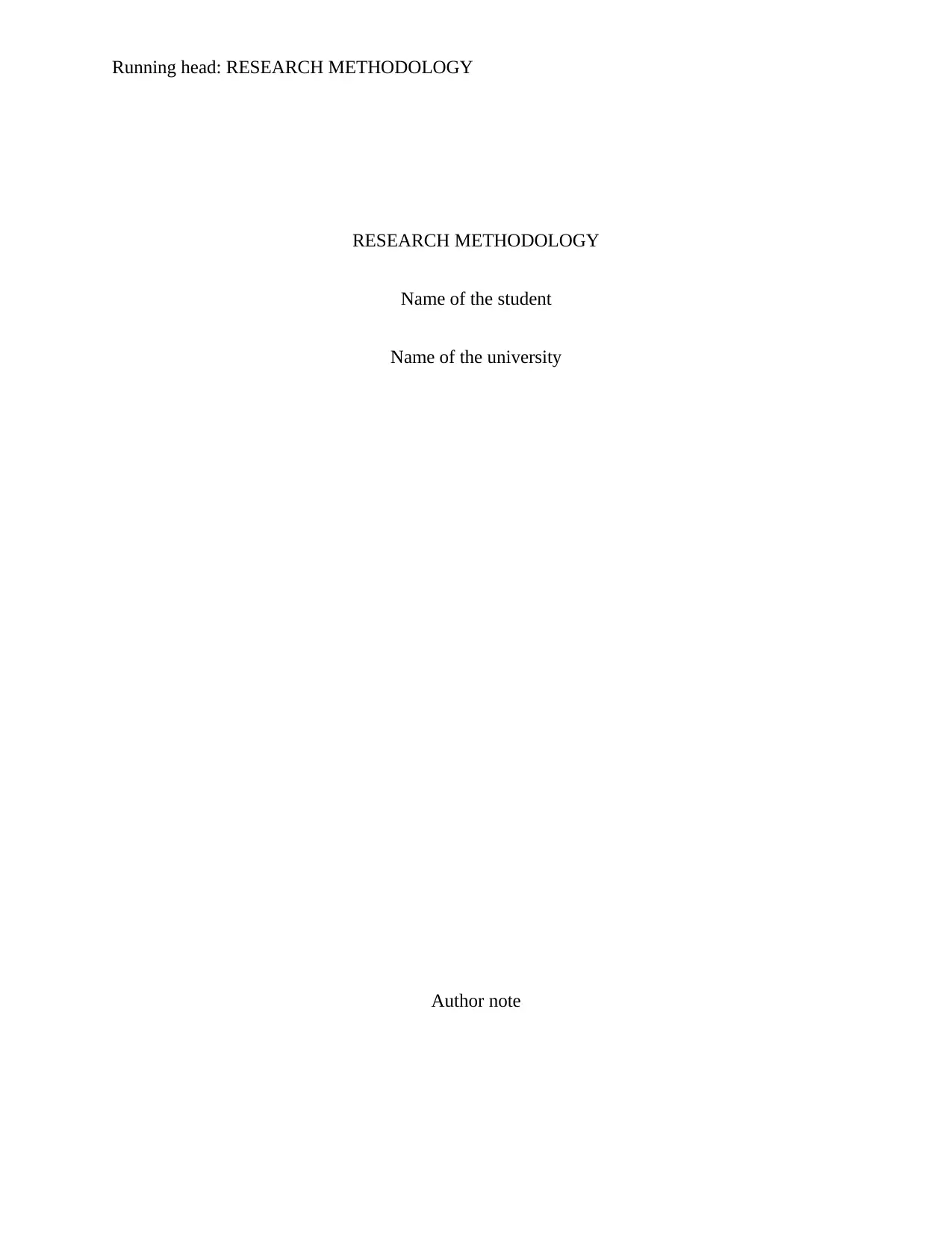
Running head: RESEARCH METHODOLOGY
RESEARCH METHODOLOGY
Name of the student
Name of the university
Author note
RESEARCH METHODOLOGY
Name of the student
Name of the university
Author note
Paraphrase This Document
Need a fresh take? Get an instant paraphrase of this document with our AI Paraphraser
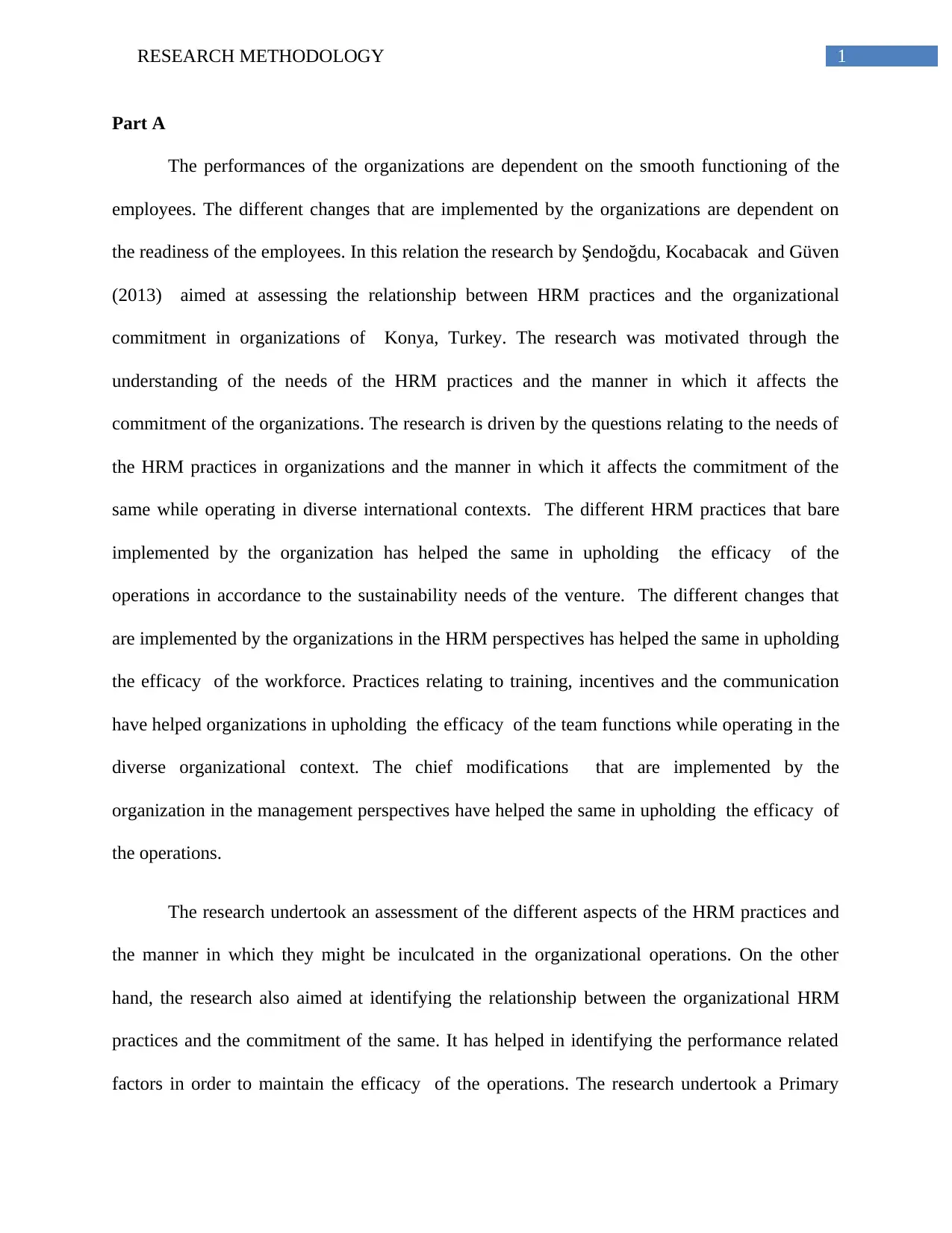
1RESEARCH METHODOLOGY
Part A
The performances of the organizations are dependent on the smooth functioning of the
employees. The different changes that are implemented by the organizations are dependent on
the readiness of the employees. In this relation the research by Şendoğdu, Kocabacak and Güven
(2013) aimed at assessing the relationship between HRM practices and the organizational
commitment in organizations of Konya, Turkey. The research was motivated through the
understanding of the needs of the HRM practices and the manner in which it affects the
commitment of the organizations. The research is driven by the questions relating to the needs of
the HRM practices in organizations and the manner in which it affects the commitment of the
same while operating in diverse international contexts. The different HRM practices that bare
implemented by the organization has helped the same in upholding the efficacy of the
operations in accordance to the sustainability needs of the venture. The different changes that
are implemented by the organizations in the HRM perspectives has helped the same in upholding
the efficacy of the workforce. Practices relating to training, incentives and the communication
have helped organizations in upholding the efficacy of the team functions while operating in the
diverse organizational context. The chief modifications that are implemented by the
organization in the management perspectives have helped the same in upholding the efficacy of
the operations.
The research undertook an assessment of the different aspects of the HRM practices and
the manner in which they might be inculcated in the organizational operations. On the other
hand, the research also aimed at identifying the relationship between the organizational HRM
practices and the commitment of the same. It has helped in identifying the performance related
factors in order to maintain the efficacy of the operations. The research undertook a Primary
Part A
The performances of the organizations are dependent on the smooth functioning of the
employees. The different changes that are implemented by the organizations are dependent on
the readiness of the employees. In this relation the research by Şendoğdu, Kocabacak and Güven
(2013) aimed at assessing the relationship between HRM practices and the organizational
commitment in organizations of Konya, Turkey. The research was motivated through the
understanding of the needs of the HRM practices and the manner in which it affects the
commitment of the organizations. The research is driven by the questions relating to the needs of
the HRM practices in organizations and the manner in which it affects the commitment of the
same while operating in diverse international contexts. The different HRM practices that bare
implemented by the organization has helped the same in upholding the efficacy of the
operations in accordance to the sustainability needs of the venture. The different changes that
are implemented by the organizations in the HRM perspectives has helped the same in upholding
the efficacy of the workforce. Practices relating to training, incentives and the communication
have helped organizations in upholding the efficacy of the team functions while operating in the
diverse organizational context. The chief modifications that are implemented by the
organization in the management perspectives have helped the same in upholding the efficacy of
the operations.
The research undertook an assessment of the different aspects of the HRM practices and
the manner in which they might be inculcated in the organizational operations. On the other
hand, the research also aimed at identifying the relationship between the organizational HRM
practices and the commitment of the same. It has helped in identifying the performance related
factors in order to maintain the efficacy of the operations. The research undertook a Primary
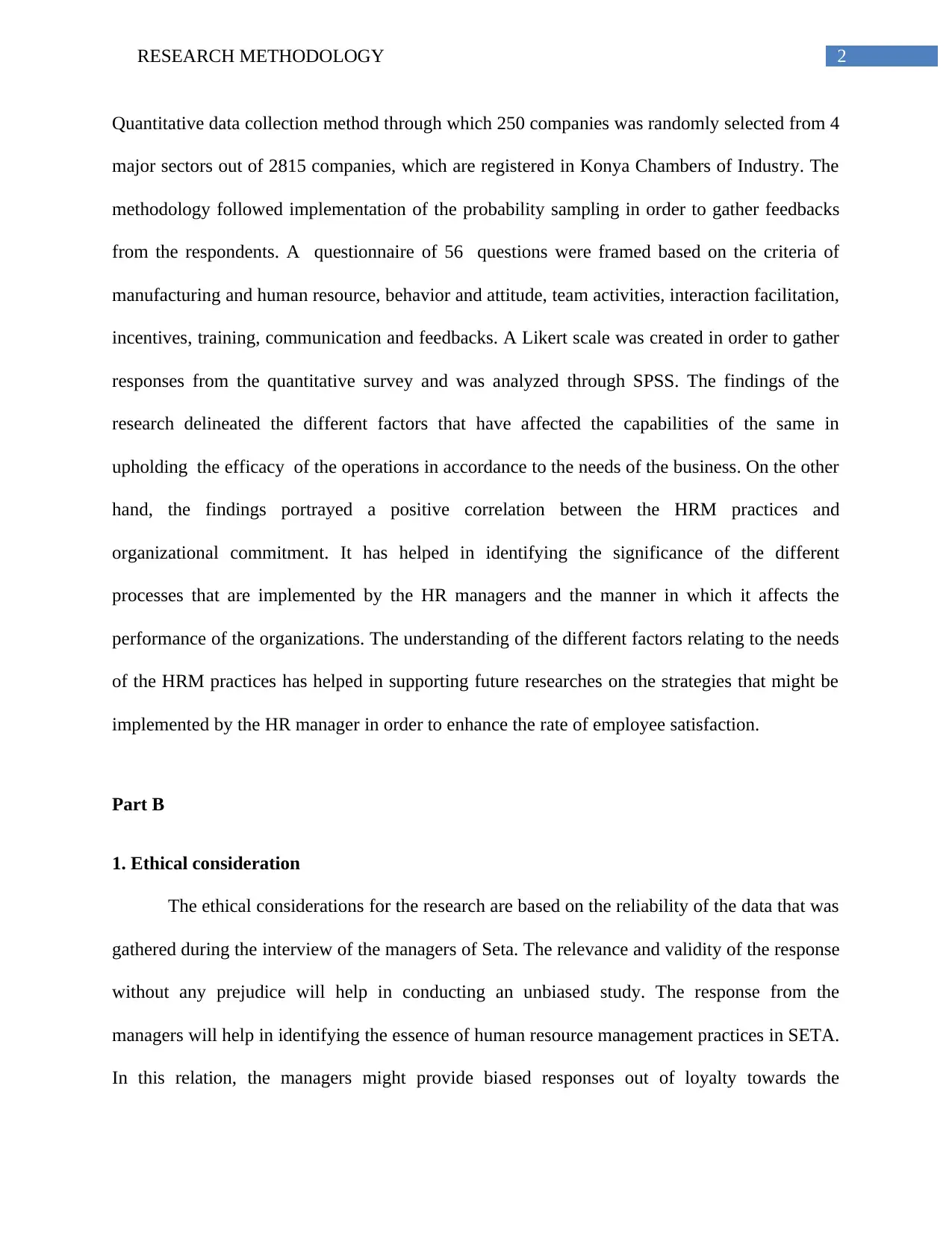
2RESEARCH METHODOLOGY
Quantitative data collection method through which 250 companies was randomly selected from 4
major sectors out of 2815 companies, which are registered in Konya Chambers of Industry. The
methodology followed implementation of the probability sampling in order to gather feedbacks
from the respondents. A questionnaire of 56 questions were framed based on the criteria of
manufacturing and human resource, behavior and attitude, team activities, interaction facilitation,
incentives, training, communication and feedbacks. A Likert scale was created in order to gather
responses from the quantitative survey and was analyzed through SPSS. The findings of the
research delineated the different factors that have affected the capabilities of the same in
upholding the efficacy of the operations in accordance to the needs of the business. On the other
hand, the findings portrayed a positive correlation between the HRM practices and
organizational commitment. It has helped in identifying the significance of the different
processes that are implemented by the HR managers and the manner in which it affects the
performance of the organizations. The understanding of the different factors relating to the needs
of the HRM practices has helped in supporting future researches on the strategies that might be
implemented by the HR manager in order to enhance the rate of employee satisfaction.
Part B
1. Ethical consideration
The ethical considerations for the research are based on the reliability of the data that was
gathered during the interview of the managers of Seta. The relevance and validity of the response
without any prejudice will help in conducting an unbiased study. The response from the
managers will help in identifying the essence of human resource management practices in SETA.
In this relation, the managers might provide biased responses out of loyalty towards the
Quantitative data collection method through which 250 companies was randomly selected from 4
major sectors out of 2815 companies, which are registered in Konya Chambers of Industry. The
methodology followed implementation of the probability sampling in order to gather feedbacks
from the respondents. A questionnaire of 56 questions were framed based on the criteria of
manufacturing and human resource, behavior and attitude, team activities, interaction facilitation,
incentives, training, communication and feedbacks. A Likert scale was created in order to gather
responses from the quantitative survey and was analyzed through SPSS. The findings of the
research delineated the different factors that have affected the capabilities of the same in
upholding the efficacy of the operations in accordance to the needs of the business. On the other
hand, the findings portrayed a positive correlation between the HRM practices and
organizational commitment. It has helped in identifying the significance of the different
processes that are implemented by the HR managers and the manner in which it affects the
performance of the organizations. The understanding of the different factors relating to the needs
of the HRM practices has helped in supporting future researches on the strategies that might be
implemented by the HR manager in order to enhance the rate of employee satisfaction.
Part B
1. Ethical consideration
The ethical considerations for the research are based on the reliability of the data that was
gathered during the interview of the managers of Seta. The relevance and validity of the response
without any prejudice will help in conducting an unbiased study. The response from the
managers will help in identifying the essence of human resource management practices in SETA.
In this relation, the managers might provide biased responses out of loyalty towards the
⊘ This is a preview!⊘
Do you want full access?
Subscribe today to unlock all pages.

Trusted by 1+ million students worldwide
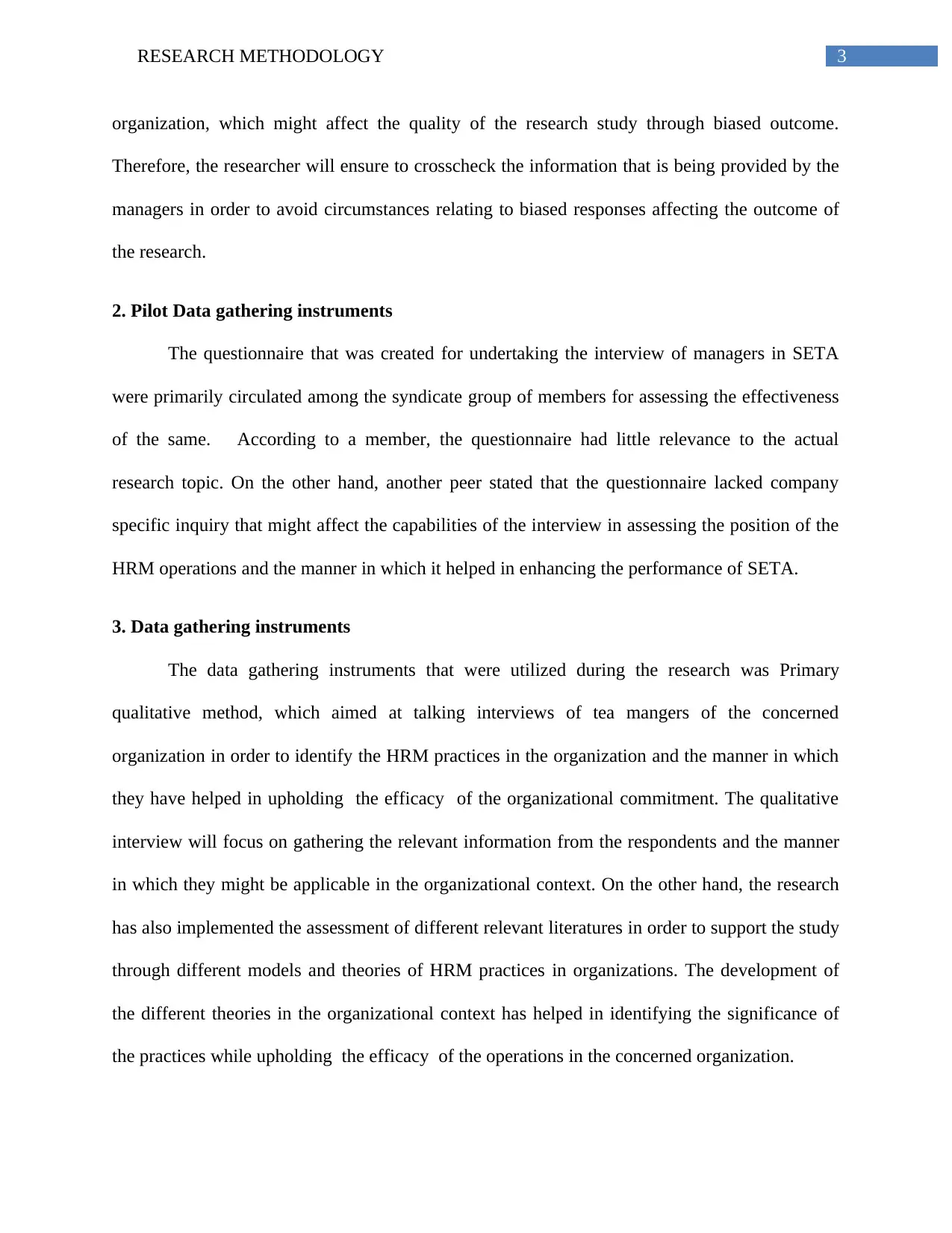
3RESEARCH METHODOLOGY
organization, which might affect the quality of the research study through biased outcome.
Therefore, the researcher will ensure to crosscheck the information that is being provided by the
managers in order to avoid circumstances relating to biased responses affecting the outcome of
the research.
2. Pilot Data gathering instruments
The questionnaire that was created for undertaking the interview of managers in SETA
were primarily circulated among the syndicate group of members for assessing the effectiveness
of the same. According to a member, the questionnaire had little relevance to the actual
research topic. On the other hand, another peer stated that the questionnaire lacked company
specific inquiry that might affect the capabilities of the interview in assessing the position of the
HRM operations and the manner in which it helped in enhancing the performance of SETA.
3. Data gathering instruments
The data gathering instruments that were utilized during the research was Primary
qualitative method, which aimed at talking interviews of tea mangers of the concerned
organization in order to identify the HRM practices in the organization and the manner in which
they have helped in upholding the efficacy of the organizational commitment. The qualitative
interview will focus on gathering the relevant information from the respondents and the manner
in which they might be applicable in the organizational context. On the other hand, the research
has also implemented the assessment of different relevant literatures in order to support the study
through different models and theories of HRM practices in organizations. The development of
the different theories in the organizational context has helped in identifying the significance of
the practices while upholding the efficacy of the operations in the concerned organization.
organization, which might affect the quality of the research study through biased outcome.
Therefore, the researcher will ensure to crosscheck the information that is being provided by the
managers in order to avoid circumstances relating to biased responses affecting the outcome of
the research.
2. Pilot Data gathering instruments
The questionnaire that was created for undertaking the interview of managers in SETA
were primarily circulated among the syndicate group of members for assessing the effectiveness
of the same. According to a member, the questionnaire had little relevance to the actual
research topic. On the other hand, another peer stated that the questionnaire lacked company
specific inquiry that might affect the capabilities of the interview in assessing the position of the
HRM operations and the manner in which it helped in enhancing the performance of SETA.
3. Data gathering instruments
The data gathering instruments that were utilized during the research was Primary
qualitative method, which aimed at talking interviews of tea mangers of the concerned
organization in order to identify the HRM practices in the organization and the manner in which
they have helped in upholding the efficacy of the organizational commitment. The qualitative
interview will focus on gathering the relevant information from the respondents and the manner
in which they might be applicable in the organizational context. On the other hand, the research
has also implemented the assessment of different relevant literatures in order to support the study
through different models and theories of HRM practices in organizations. The development of
the different theories in the organizational context has helped in identifying the significance of
the practices while upholding the efficacy of the operations in the concerned organization.
Paraphrase This Document
Need a fresh take? Get an instant paraphrase of this document with our AI Paraphraser
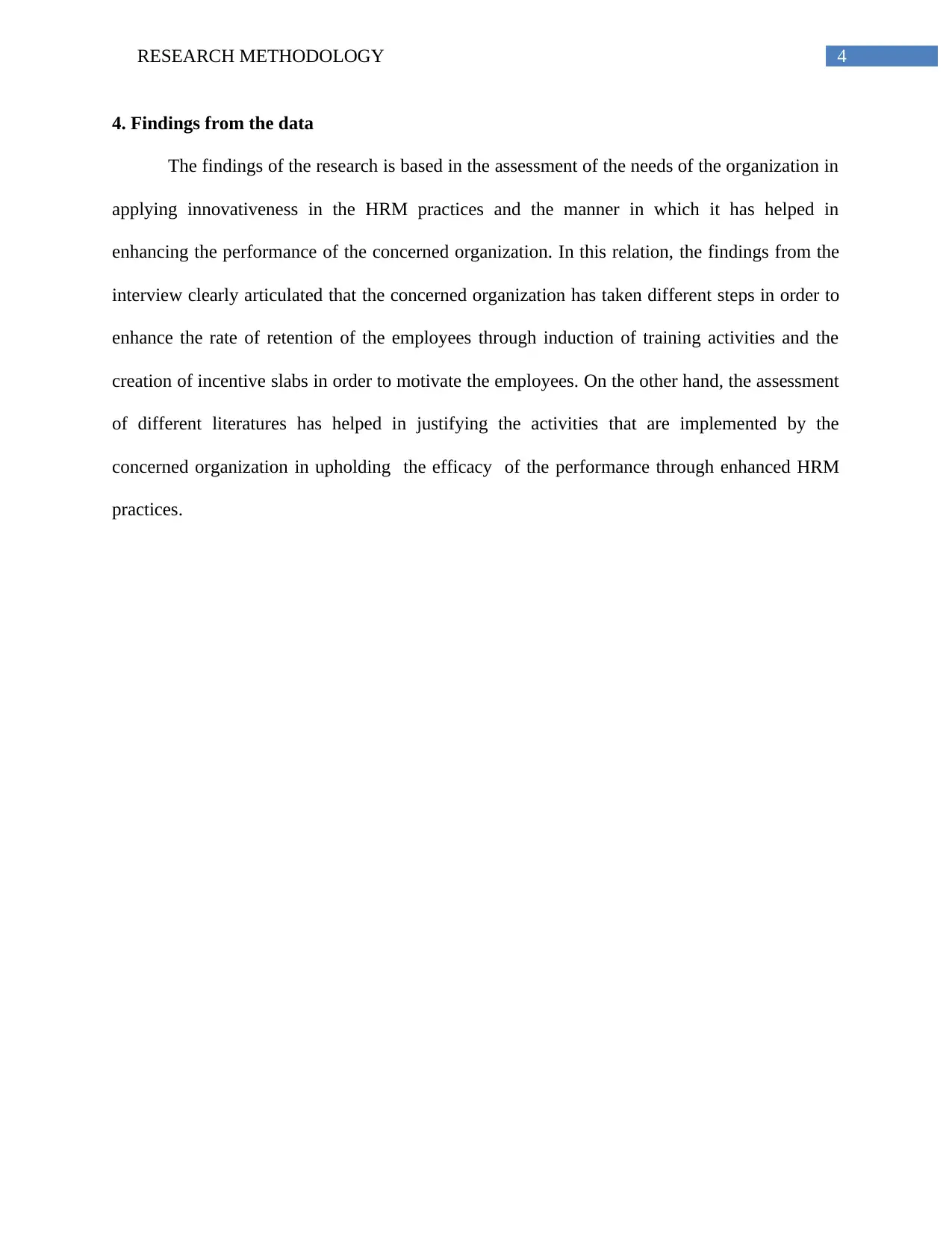
4RESEARCH METHODOLOGY
4. Findings from the data
The findings of the research is based in the assessment of the needs of the organization in
applying innovativeness in the HRM practices and the manner in which it has helped in
enhancing the performance of the concerned organization. In this relation, the findings from the
interview clearly articulated that the concerned organization has taken different steps in order to
enhance the rate of retention of the employees through induction of training activities and the
creation of incentive slabs in order to motivate the employees. On the other hand, the assessment
of different literatures has helped in justifying the activities that are implemented by the
concerned organization in upholding the efficacy of the performance through enhanced HRM
practices.
4. Findings from the data
The findings of the research is based in the assessment of the needs of the organization in
applying innovativeness in the HRM practices and the manner in which it has helped in
enhancing the performance of the concerned organization. In this relation, the findings from the
interview clearly articulated that the concerned organization has taken different steps in order to
enhance the rate of retention of the employees through induction of training activities and the
creation of incentive slabs in order to motivate the employees. On the other hand, the assessment
of different literatures has helped in justifying the activities that are implemented by the
concerned organization in upholding the efficacy of the performance through enhanced HRM
practices.
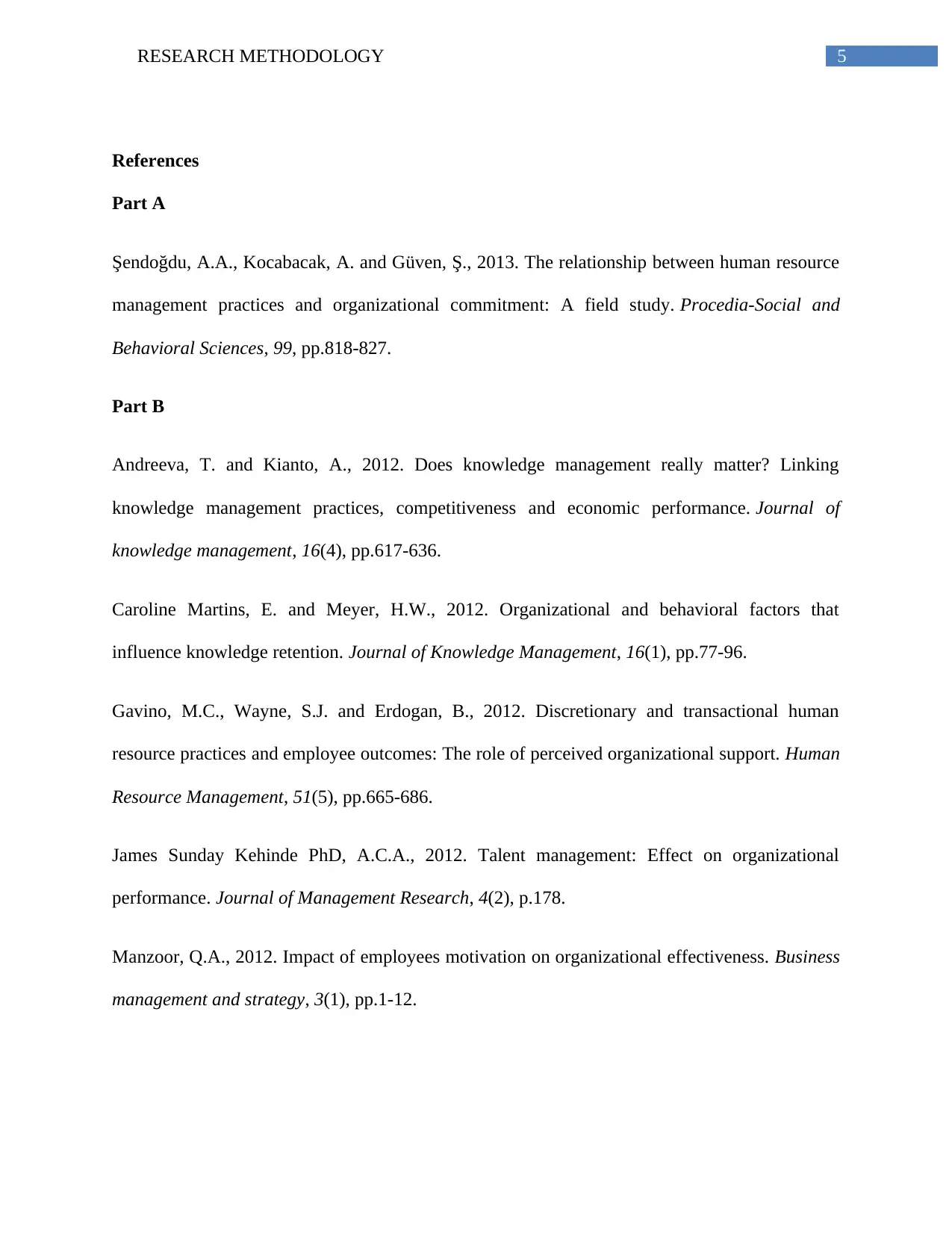
5RESEARCH METHODOLOGY
References
Part A
Şendoğdu, A.A., Kocabacak, A. and Güven, Ş., 2013. The relationship between human resource
management practices and organizational commitment: A field study. Procedia-Social and
Behavioral Sciences, 99, pp.818-827.
Part B
Andreeva, T. and Kianto, A., 2012. Does knowledge management really matter? Linking
knowledge management practices, competitiveness and economic performance. Journal of
knowledge management, 16(4), pp.617-636.
Caroline Martins, E. and Meyer, H.W., 2012. Organizational and behavioral factors that
influence knowledge retention. Journal of Knowledge Management, 16(1), pp.77-96.
Gavino, M.C., Wayne, S.J. and Erdogan, B., 2012. Discretionary and transactional human
resource practices and employee outcomes: The role of perceived organizational support. Human
Resource Management, 51(5), pp.665-686.
James Sunday Kehinde PhD, A.C.A., 2012. Talent management: Effect on organizational
performance. Journal of Management Research, 4(2), p.178.
Manzoor, Q.A., 2012. Impact of employees motivation on organizational effectiveness. Business
management and strategy, 3(1), pp.1-12.
References
Part A
Şendoğdu, A.A., Kocabacak, A. and Güven, Ş., 2013. The relationship between human resource
management practices and organizational commitment: A field study. Procedia-Social and
Behavioral Sciences, 99, pp.818-827.
Part B
Andreeva, T. and Kianto, A., 2012. Does knowledge management really matter? Linking
knowledge management practices, competitiveness and economic performance. Journal of
knowledge management, 16(4), pp.617-636.
Caroline Martins, E. and Meyer, H.W., 2012. Organizational and behavioral factors that
influence knowledge retention. Journal of Knowledge Management, 16(1), pp.77-96.
Gavino, M.C., Wayne, S.J. and Erdogan, B., 2012. Discretionary and transactional human
resource practices and employee outcomes: The role of perceived organizational support. Human
Resource Management, 51(5), pp.665-686.
James Sunday Kehinde PhD, A.C.A., 2012. Talent management: Effect on organizational
performance. Journal of Management Research, 4(2), p.178.
Manzoor, Q.A., 2012. Impact of employees motivation on organizational effectiveness. Business
management and strategy, 3(1), pp.1-12.
⊘ This is a preview!⊘
Do you want full access?
Subscribe today to unlock all pages.

Trusted by 1+ million students worldwide
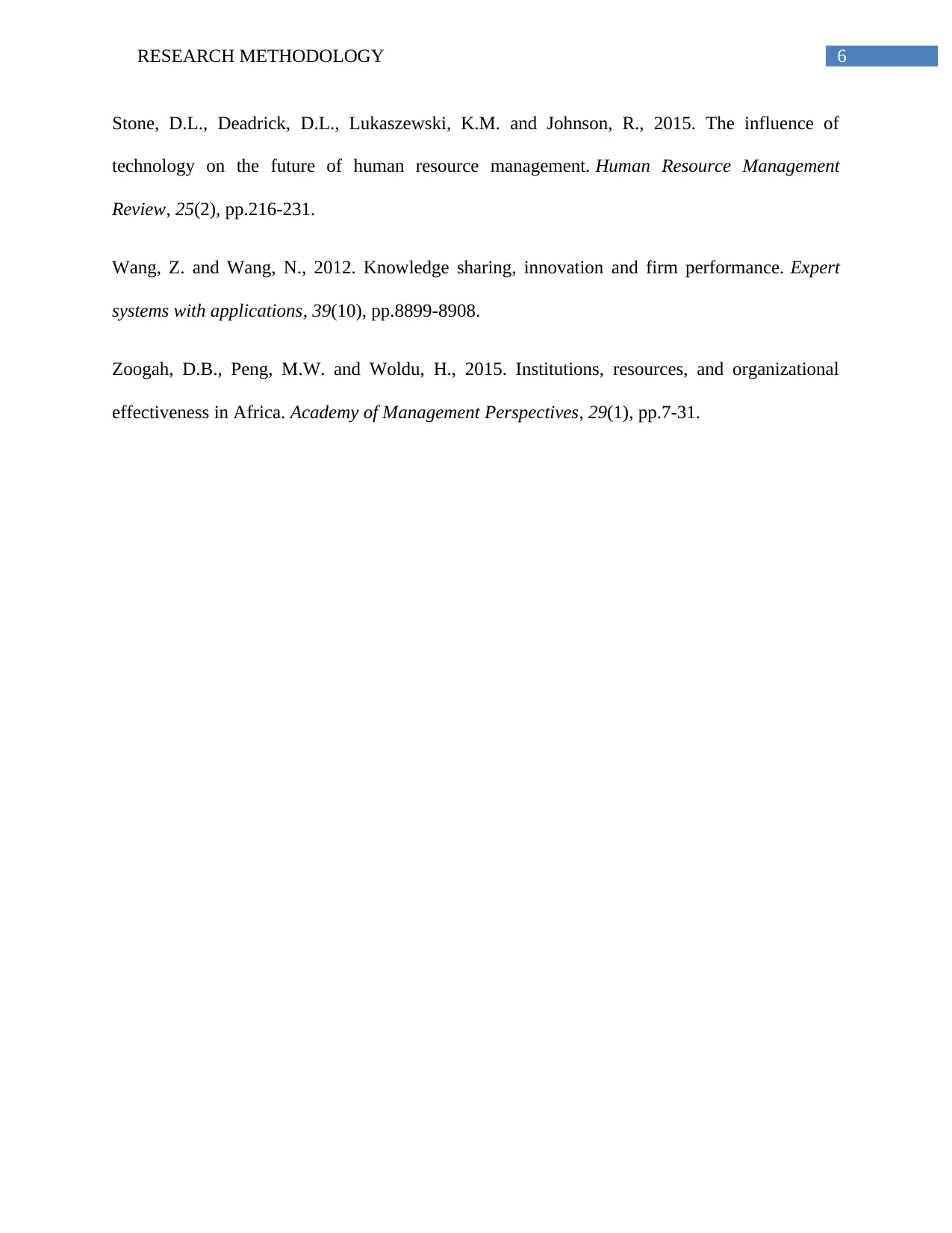
6RESEARCH METHODOLOGY
Stone, D.L., Deadrick, D.L., Lukaszewski, K.M. and Johnson, R., 2015. The influence of
technology on the future of human resource management. Human Resource Management
Review, 25(2), pp.216-231.
Wang, Z. and Wang, N., 2012. Knowledge sharing, innovation and firm performance. Expert
systems with applications, 39(10), pp.8899-8908.
Zoogah, D.B., Peng, M.W. and Woldu, H., 2015. Institutions, resources, and organizational
effectiveness in Africa. Academy of Management Perspectives, 29(1), pp.7-31.
Stone, D.L., Deadrick, D.L., Lukaszewski, K.M. and Johnson, R., 2015. The influence of
technology on the future of human resource management. Human Resource Management
Review, 25(2), pp.216-231.
Wang, Z. and Wang, N., 2012. Knowledge sharing, innovation and firm performance. Expert
systems with applications, 39(10), pp.8899-8908.
Zoogah, D.B., Peng, M.W. and Woldu, H., 2015. Institutions, resources, and organizational
effectiveness in Africa. Academy of Management Perspectives, 29(1), pp.7-31.
Paraphrase This Document
Need a fresh take? Get an instant paraphrase of this document with our AI Paraphraser
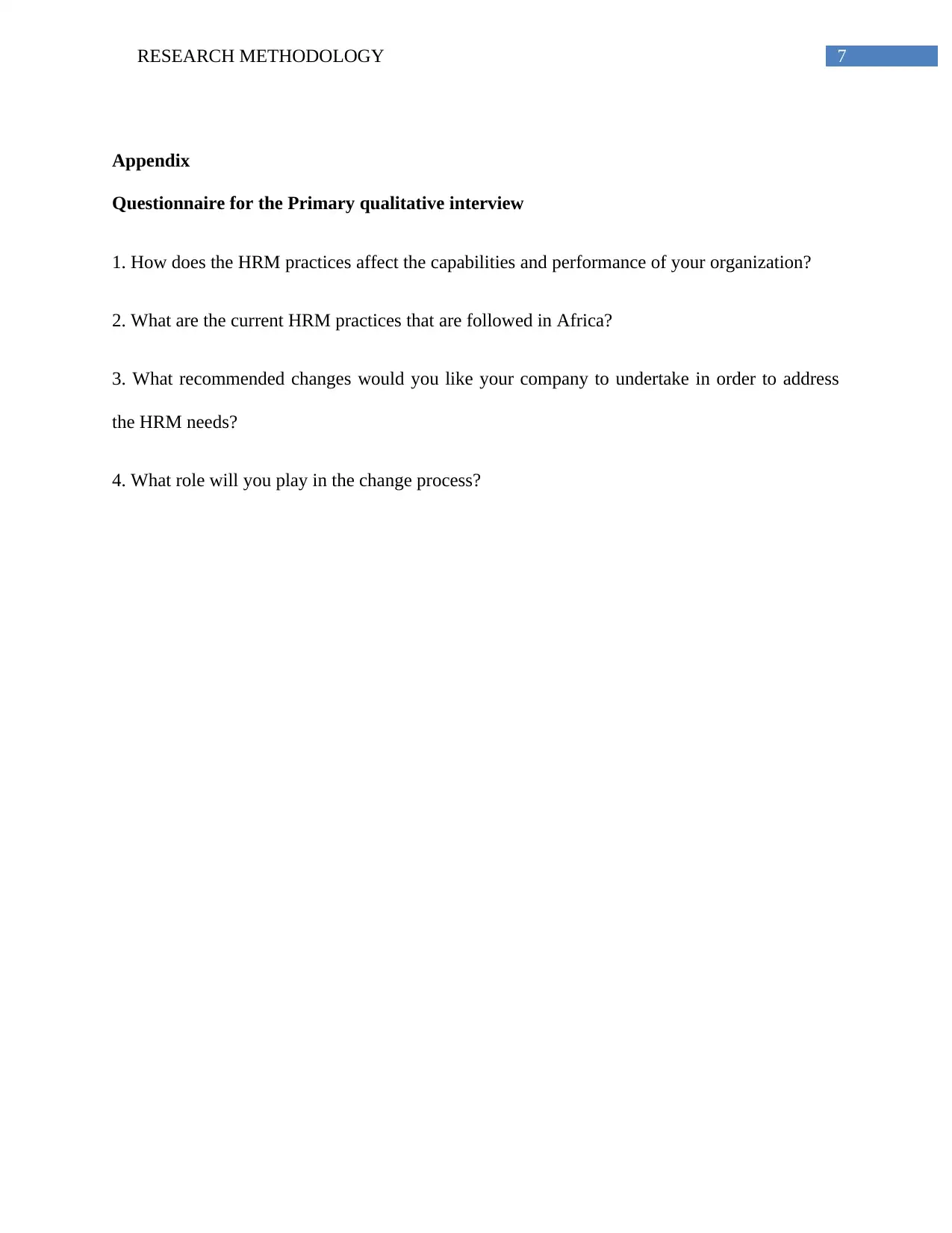
7RESEARCH METHODOLOGY
Appendix
Questionnaire for the Primary qualitative interview
1. How does the HRM practices affect the capabilities and performance of your organization?
2. What are the current HRM practices that are followed in Africa?
3. What recommended changes would you like your company to undertake in order to address
the HRM needs?
4. What role will you play in the change process?
Appendix
Questionnaire for the Primary qualitative interview
1. How does the HRM practices affect the capabilities and performance of your organization?
2. What are the current HRM practices that are followed in Africa?
3. What recommended changes would you like your company to undertake in order to address
the HRM needs?
4. What role will you play in the change process?
1 out of 8
Related Documents
Your All-in-One AI-Powered Toolkit for Academic Success.
+13062052269
info@desklib.com
Available 24*7 on WhatsApp / Email
![[object Object]](/_next/static/media/star-bottom.7253800d.svg)
Unlock your academic potential
Copyright © 2020–2026 A2Z Services. All Rights Reserved. Developed and managed by ZUCOL.



